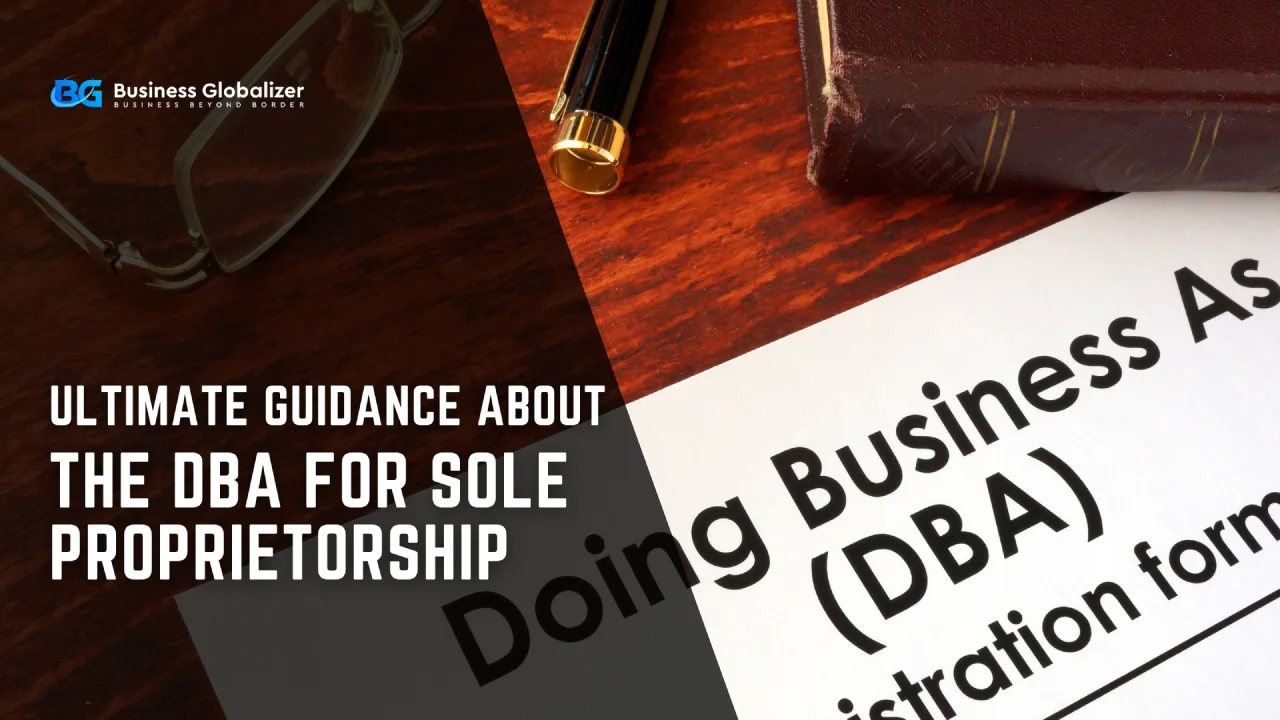If you are a sole proprietor in the U.S. and plan to take your business to the next level as a non-resident by giving it a distinctive or unique name, you are in the right spot. In the wide world of entrepreneurship, DBA is one of the most useful tactics to improve your business’s creditability.
But what on earth is a DBA, you ask? No worries; we are here to inform you. We’ll explain what a DBA, or assumed name, is and why you must file a DBA for your sole proprietorship business structure. A DBA can relieve the many stresses of running a sole proprietorship. This blog will help you by enlightening your basic knowledge of DBAs for sole proprietorships. Prepare to open new doors, build your business’s credibility, and set it up for success.
Let’s just jump in!
What Is a DBA?
So, let’s clear up your first question what on earth is DBA? In general, a DBA is simply a nickname that you can use for branding or marketing purposes. When a business decides to operate under a different name than its legal or real name for branding or marketing purposes, it’s called a DBA or assumed business name. This is also known as a fictitious business or trade name in some states.
What Is a Sole Proprietorship?
“Sole” means lone or single. In simple words, when a person owns and runs an unincorporated entity alone, it’s called a sole proprietorship. A sole proprietor is someone who owns and operates an unincorporated business alone. Due to a lack of governmental regulations, the owner can easily form and close this.
Eventually, most of today’s businesses start as sole proprietorships. After a certain time, they may reform other legal structures based on profits, the company’s growth, or new business ideas.
Sole proprietorships include tutors, grocery shops, business consultants, freelancers, photographers, landscapers, social media specialists, digital marketers, etc.
What Is an Example of a DBA for Sole Proprietorship?
If you use a separate name other than your legal or real name, it’s addressed as DBA, doing business as, or a fictitious name. A DBA can be a good fit for those who don’t want to establish a Corporation or separate LLC or want to expand their current business structure.
Establishing a business without registration with the state or county is considered a sole proprietorship business. Sole proprietors often use different names instead of real ones to create their own brands or to hide their identities.
Let’s say your name is David Cruise, and you want to open a coffee shop in front of your house but don’t want to operate it under your own name. You could file a DBA for your shop—give it the name “Cafe Cuppochino”—and start a business under that name.
Are a DBA and a Sole Proprietorship the Same?
A sole proprietorship and DBA (Doing Business As)- these two terms can lead to confusion. A DBA name (Doing Business As) and a sole proprietorship are related but distinct concepts.
Since a DBA name is different from the owner’s personal name, some individuals mistakenly assume that it establishes a distinct legal entity. In reality, when a sole proprietor uses a DBA, the sole proprietorship and its DBA name are one and the same regarding legal liability. Whether you get a DBA name or use your own name, you are responsible for all the business’s debts and obligations.
To get clear insights, let’s understand the nature of Sole proprietorship and DBA.
Characteristics of Sole Proprietorship
- A sole proprietorship is an unincorporated entity with a legal business structure.
- A sole proprietorship business structure is a pass-through entity for tax purposes. You don’t have to pay taxes on your business’s income. Instead, you can pay taxes on the income at your personal tax rate.
- You can begin a sole proprietorship business at a lower cost.
- When you conduct a business as a sole proprietorship, you will engage more with customers, employees, and the market, which helps the business grow.
- In a sole proprietorship, the business owner has to assume all the business’s liabilities.
- Since creditors cannot seize your personal assets in the event that something goes wrong with the business, it offers some limited liability protection.
- A sole proprietorship business can use a DBA for branding and marketing purposes.
Characteristics of DBA
- A DBA is a trade or fictitious name that allows a business to operate under a different name than the owner’s personal name or the legal name of the entity.
- Using DBA, you can have multiple businesses.
- The process of registering for DBA varies state- or county-wise.
- In some states, you must notify the public through local publications or newspapers before registering for DBA.
- The individual or partnership behind the DBA remains fully responsible for any debts, legal actions, or liabilities incurred by the business. It doesn’t provide liability protection.
- A DBA name does not establish a new legal company but serves as an identity name for businesses.
Do I Need a DBA as a Sole Proprietor?
You might wonder why we mentioned at the beginning of this content that DBA is one of the most useful tactics to improve your business’s creditability.
Imagine that David Cruise is a sole proprietor. He owns a coffee shop business that has gained popularity over time. With the popularity of your business, your customers are also increasing. How will your customers figure you out? You are absolutely right. They will figure out your shop by the business name or brand name. If you don’t want to use your own real name, you must have a DBA.
There are several reasons why you need to get a DBA for your sole proprietorship:
- Legally Distinct Identity: As a sole proprietorship, the business owner and the business are not considered separate legal entities, unlike corporations or LLCs. Nonetheless, using a DBA (Doing Business As) enables the sole proprietor to establish a distinct business identity. This helps boost your brand.
- Business Name Requirements: In certain jurisdictions, registering DBA is mandatory if sole proprietors use a business name other than a legal name. This registration helps avoid confusion for customers and other businesses.
- Banking and Financial Transactions: If you want to open a business bank account, having a DBA or fictitious name registration can make the process easier. Banks typically ask for a DBA name to ensure that the account is intended for a legitimate business purpose.
- Contracts and Legal Documents: A DBA provides a recognized and documented business name that can be used for entering into any contract or legal agreement instead of the owner’s name.
- Compliance and Transparency: Registering a DBA promotes transparency and compliance with local regulations.

How Do I Get a DBA for a Sole Proprietorship?
If you want to avoid the complexity or expenses of creating a formal LLC or corporation, filing a DBA is undoubtedly the right choice for you to run a business in this market. We understand what you’re probably thinking about how to file a DBA for your sole proprietorship. Here are a few steps you can follow:
- You must choose a name that is short, catchy, and relevant to your business type.
- After deciding the name, consult legal business experts or talk to the Secretary of State’s office.
- Follow their instructions and gather the required information.
- To register a DBA, you must now complete the forms that the county clerk’s office or the Secretary of State’s office will provide for you.
- Before submitting the registration, you might check whether you need to announce the public notice because some states require public announcements to notify the state population during DBA registration.
- Once your necessary paperwork is completed, submit the registration form and the required fees.
- Once you submit the registration form, follow up with the state’s office to confirm if your DBA name is registered for your sole proprietorship.
FAQs on DBA
Q1: I want to change my sole proprietorship name. Do I need to file a DBA?
Answer: If you want to use any name other than your business or real name, you must file for DBA. Even if you use your last name in your business name, you should consider a DBA.
Q2: Should I use my name for a sole proprietorship?
Answer: It’s better to file a DBA name to create a distinct identity for your business.
Q3: How many DBAs is a sole proprietor allowed to use?
Answer: Generally, no restrictions exist on how many DBAs you can have for a sole proprietorship. But most often, you can’t have more than one as a sole proprietor in the same state.
Q4: Do sole proprietors need a DBA in Texas?
Answer: In Texas, sole proprietors aren’t legally required to have a DBA. But it’s best practice to have a DBA for branding or marketing.
Conclusion
Lastly, registering a DBA or fictitious name for a sole proprietorship may vary depending on your jurisdiction. It is recommended that you seek guidance from local government agencies or legal professionals. Also, you can contact us to understand the specific rules and regulations in your area.






